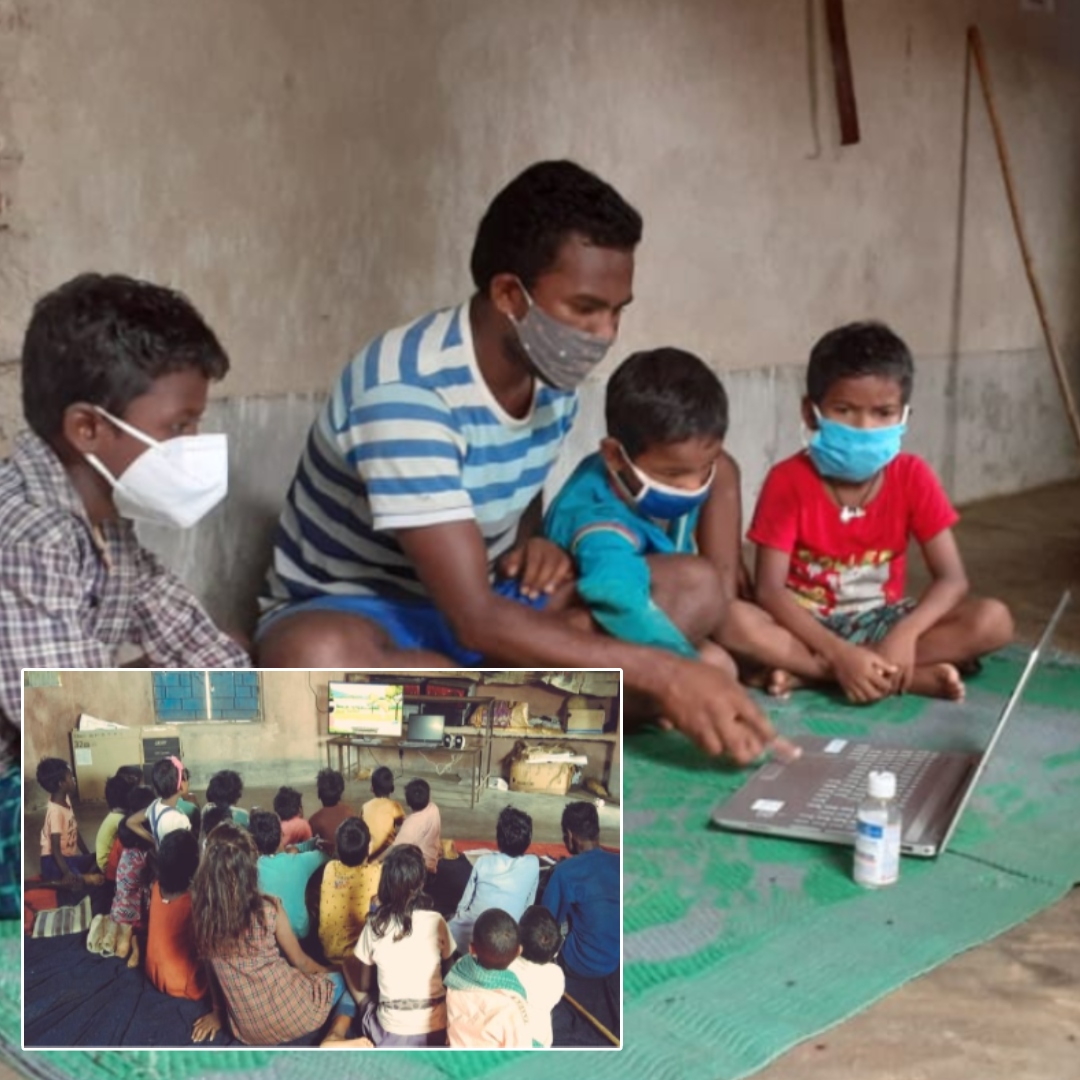
Image Credits: Gautam Bisht
Capacity Building Of Adivasi Teachers: This NGO In Bihar Is Taking Learning To Naxal-Affected Tribal Villages
Bihar, 15 Aug 2021 5:09 AM GMT | Updated 15 Aug 2021 5:56 AM GMT
Editor : Ankita Singh |
A literature lover who likes delving deeper into a wide range of societal issues and expresses her opinions about the same. Keeps looking for best-read recommendations while enjoying her coffee and tea.
Creatives : Anuran Sadhu
A post grad journalism student of SIMC, Pune with a passion for using words to get my message across in the most unique ways possible and curiosity is the force that drives me to learn and experience more every day.
A unique project run by the organization works on the capacity building of local Adivasi youth teachers, which indirectly impacts their classrooms and the children they teach.
If one ever leaves the hustle-and-bustle of city life and spends some time in the remotest villages of our country, one would know how time runs at two different speeds. It's an entirely different world out there, where opportunities and resources are hard to find.
In 2015, Gautam Bisht, hailing from Dehradun, had just completed his Master's from Ambedkar University, Delhi and started pursuing a Masters in Philosophy degree in Development Practice. During his MPhil programme, an Action Research and Rural Immersion course took Gautam to a Naxal affected tribal village in the Chakai block of Bihar. His course required him to live with the village community for two years, arrive at a research problem and find a solution to it. However, the course turned out to be the turning point in his life.
Gautam, who was living in Delhi, was excited to have his first experience of rural India and take his MPhil degree forward. But the first day he set foot in the village, he was taken by surprise. The village looked nothing like he had imagined.
The Adivasi village was naturally under-resourced and economically deprived, with no forest cover and dried up water bodies. People lived on potatoes and rice for months, with only two meals a day. What pained Gautam the most was the broken relationship between the young people in the community and education. After completing his course, he felt the need to do something. Gautam designed a two-year pilot project to create community learning centres to be run by the local youth. And again, after two years, he decided to make a more prolonged investment of time.
Birth Of Sinchan
Finally, in 2019, Gautam and Shuvajit Chakroborty, a development practitioner, started Sinchan Education and Rural Entrepreneurship Foundation, or simply Sinchan Foundation. It is a not-for-profit organization that works with the community youth to design contextual learning frameworks and build rural entrepreneurial ecosystems.
"Adivasi community suffers from the highest school dropout rates in the country. We see it as a failure of a system to account for their cultural resources. That's what we want to change," said Gautam, who is pursuing a PhD in Learning Sciences at Northwestern University.
The organization wants school systems to be more accommodating of what the Adivasis already know, rather than imposing a new curriculum or pedagogy on them. They have documented the local foods and herbs that are only known to the Santhal community of that region.
"We are trying to build evidence of the tools that we create that they work, and we would like to advocate the government to use them," Gautam told The Logical Indian.
The organization also uses the IVRS technology to bridge the digital divide and communication gap between a classroom full of Santhali students and the teachers. The technology requires the students who do not have smart-gadgets to send a missed call to a particular number and receive pre-recorded video or audio lessons created by the teachers. The lessons are creatively made with songs, stories, painting, dances, music, and conversations to make learning more fun for the tribal kids.
Project Kurumutu
However, the main focus of the organization in recent times has been on Project Kurumutu, in the Chakai block of Bihar. In April 2020, soon after the lockdown was announced, physical learning centres closed down.
"We had the idea of using the online platforms to train the local Adivasi teachers in skills like English speaking," Gautam said. By October, they had found some volunteers who created new ways of learning. In the next three months, the system evolved on connecting the young volunteers, the pedagogy, and how it should operate.
Project Kurumutu got organized and went official from October 2020. "The project facilitates the youth from urban spaces to connect to young Adivasi people in the region to teach them coding, graphics designing, and video editing, among other skills," Gautam noted.
Since Project Kurumutu works on the capacity building of local Adivasi youth teachers, it indirectly impacts their classrooms and the children they teach. "So in a way, their growing capacity in English or digital literacy is passed onto a larger community, who cannot directly address these skills locally," Gautam shares with The Logical Indian.
To supplement project Kurumutu, the organization continuously runs fundraisers so that these teachers could add digital infrastructures to their classes, and the children in early years imbibe these skills. "Till now, eight centres run by the youth have laptops and internet connections due to the collected funds, and we hope to reach 20 by December 2021," Gautam said.
New Skills, New Opportunities
Before this project, the young people from the tribal community could only think of clerical 'Group D' jobs. Now, because of their new skills, they aspire to code, become a content writer and get a job in the cities, as told by Gautam.
"While the earlier projects emphasized their cultural roots, Project Kurumutu focused on being more global. They cannot always be just the guardian of their culture and not know things people that the outside world is familiar with," Gautam said in a conversation with The Logical Indian. Being exposed to recorded videos in English sent by young volunteers in the USA, the Santhali youth have honed their spoken English skills.
Besides Gautam, the project director, Pramiti Negi and Nilambar Singh Basnet work as the project anchors, and Kusum Hansda works as the community coordinator.
"Pramit Negi, who come from an indigenous community herself joined the organization as a volunteer and has since built the curriculum and maintains the drive where all methods and all the classes are made and available to everyone," Gautam added. Nilambar, on the other hand, manages the social media, and a team of 12 volunteers from India and five from the USA helps run Project Kurumutu smoothly.
Yet, with all the efforts the Sinchan Foundation has put in, in the Chakai block of Bihar, the work is far from finished. The challenges are enormous as they have existed for decades.
The Naxal influence and ingrained corruption within the community have made the job of NGOs like Sinchan Foundation even harder. Gautam believes the government can work only if NGOs and activists can provide evidence of the proposed changes, and the Sinchan Foundation is doing exactly that.
Also Read: Students With Special Needs Face Challenges Of Virtual Learning Amid Pandemic
 All section
All section














